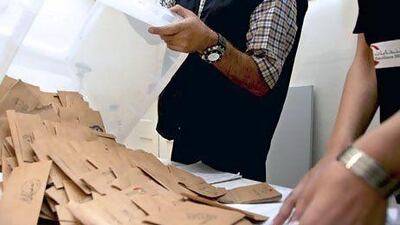You have got to hand it to the Lebanese private sector. Despite the Syrian civil war being the biggest threat to regional stability since the creation of the state of Israel in 1948, and a lax internal security situation that has seen their tourist industry implode, the sector plugs on regardless. The latest burst of confidence has come from the Doumet Group, owners of Le Bristol, which has revealed that it is embarking upon a US$30 million refurbishment of the renowned Beirut hotel.
Mind you, with none of the free-spending Arab tourists expected this summer, now is probably a good time to get the builders in. But it is this unquenchable belief in a bullish future that is so remarkable.
Around the same time, Makram Sader, the head of the Association of Lebanese Banks, revealed Lebanon's public debt had risen by nearly $5 billion to $59.1bn during Najib Miqati's 21-month term as prime minister, a period blighted by political confusion, a lack of reform and zero economic policy.
More political stagnation, unfettered spending and falling revenues could see the public debt rise to more than $62bn by the end of the year.
So with parliamentary elections originally due to be held this month, you would have thought that our dizzying array of political parties would have rolled out their economic policies months ago. In a country that has seen growth drop from 6 per cent to 1 per cent in 18 months, it's all about getting back our mojo and reassuring the Doumets and their brave ilk.
Makes sense right? Not in Lebanon, where programmes are not part of the electoral process and voters do not hold politicians accountable for any wild promises. Making the economy tick is a job unofficially ceded to the private sector decades ago.
But still the Englishman in me looks for a hint of change, that maybe when we elect someone to public office, he or she actually shows up for work (and trust me, there are a handful who don't). Only the Free Patriotic Movement (FPM) by claiming to "adhere to the free [sic] economic system and personal initiative" has anything on paper. It's hardly a blueprint for prosperity. And let's not forget also that the FPM's closest political ally is Hizbollah, a party whose martial activities have done the most to crush Lebanon's economic spirit. Go figure.
Yep that's it. No party has come out and said it is going to make X or Y or Z a priority or shared its vision for fiscal policy or debt reduction. Education, the environment, health care and welfare, fundamental election issues in most modern societies, don't even enter the dialogue.
Take the Syrian Social National Party (the right-wing pan-Arab party) and the Ba'ath Arab Socialist Party. Both have two MPs and yet neither campaigned on anything resembling a ticket.
Voter behaviour is very much along sectarian lines and in a large part determined by patronage. The Shia will vote for Hizbollah or Amal, the Sunni are by and large behind the absent Saad Hariri's Future Movement. The Druze will vote for their feudal leaders, either Walid Jumblatt or Talal Arslan, while the Christians are split between the Lebanese forces, the Kataeb and the FPM.
Indeed earlier this year a new draft election law was proposed that decreed that people should vote only for members of their own sect. Thankfully, it was nothing more than a political red herring, and has since been scrapped, but for the short period that it became part of the national dialogue, it won over many Lebanese who see themselves as first and foremost part of a sect and as a nation second.
Yet on some level, the tacit agreement that the private sector does its bit and the politicians play at politics, works (even if mutual interests can end up being quite murky), and people like the Doumets continue to invest in their country.
Why? Because it is home and they have little option but to stand and fight.
Michael Karam is a Beirut-based freelance writer

Lebanon's private sector carries on despite distractions
You have to hand it to the Lebanese private sector. Despite the Syrian civil war being the biggest threat to regional stability since the creation of the state of Israel in 1948, it plugs on regardless.
Most popular today
